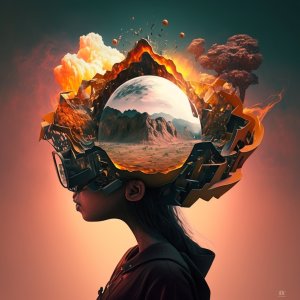Intro
“The Metaverse” as a concept was brought to the public consciousness in October 2021 when Mark Zuckerberg went on stage and publicly declared Facebook’s new name to be Meta and changed the company’s mission to creating a shared virtual reality world.
However despite a huge amount of money being poured into Meta’s Reality Labs division and multiple millions being invested in metaverse projects – the term has yet to be fully defined and there has been no unifying vision of what a “metaverse” actually is. Some interpretations range from business-related VR use to a full-dive Matrix/Ready Player One experience where humans completely leave the real world behind and exist in a fantasy space of 0s and 1s. To show how undefined this concept is in today’s vernacular; we still haven’t nailed down whether it’s “the” metaverse, “a” metaverse or just “metaverse”.
All of the definitions so far fundamentally lack the core concept of a metaverse: the “meta” or self-referential part of it. Every definition to date has mostly defined a metaverse by the technology it uses, rather than what it actually is. In this article we will define a metaverse by this core concept: a metaverse is a fictional universe or world which exists to create it’s prerequisite conditions.

metaverse
Noun
Plural: metaversii.
A self-creating universe.
Well-Trodden Path
By this definition a metaverse is not a new concept; there are a few other metaversii that exist through history. Some examples might include the EPCOT Center, Star Trek, The Venus Project and even the World Fairs of the 1800s. This excerpt from the Villanova University regarding the latter is pretty on-point (emphasis added);
“…was inseparable from the larger constellation of ideas about race, nationality, and progress that molded the fairs into ideologically coherent ‘symbolic universes’ confirming and extending the authority of the country’s corporate, political, and scientific leadership”.”
EPCOT, or as it’s less often called: “Experimental Prototype Community of Tomorrow” was originally an experimental planned community to demonstrate and promote new methods of living – much like The Venus Project, which attempts to do the same through a combination of physical location and multimedia approach;
“Phase Two includes the production of documentaries to help introduce this direction to the world. Two major documentaries have already been completed: Paradise or Oblivion and The Choice is Ours.”
Finally, the most well-known example of a metaverse is Star Trek, which created a universe where human society has evolved beyond racial, ethnic and national boundaries to create a better tomorrow. It sought to create this universe by creating a modern world where black actors could have equal roles on television shows, culminating famously in the world’s first televised interracial kiss.
Skipping Stones
Despite it’s malignancy on the concept of a metaverse, cryptocurrency even briefly touches on this idea of creating a real world through the actions of a fictional one. Bitcoin was originally created to dethrone the global banking system and create a new world order. This concept followed into the crypto/metaverse boom of 2022 and DAOs (Decentralized Autonomous Organizations) are a sort of proto-attempt at creating a real governing system through the actions of a fictional one. However, most crypto+metaverse projects skip off of the idea of creating a metaverse and focus on wealth extraction.
The closest example to a metaverse project trying to actually be a metaverse is Star Atlas. It’s CEO, Michael Wagner is on the record saying that this project is like a new virtual nation state;
“We think about what we’re building at Star Atlas as almost like an independent nation-state,” Wagner says.
In order to become a true metaverse, Star Atlas would need to create a virtual nation state that over time would grow and become a real state; or create a world wherein digital nation states could possess some sort of validity. It could do this through creating a virtual prototype of this state and designing the game world to have real-world behavioral motivators for players that fit thematically within it. If it wanted to explore a new method of resource allocation, banking, etc. it would have to do the same for these different aspects.
When a fictional world’s design spills over from creating an interesting world and into answering questions like “how would this world function and how can this get us there”, that is when it becomes a true metaverse.

A Singular Point in Time
The Singularity is an inflection point in human advancement and heralds a point when human society and technology advance exponentially past our understanding. Some believe this is when general artificial intelligence is created. Others believe that AI is the product of a society that has reached a technological singularity. While the specifics of the singularity are still a topic of great debate, metaversii that can go from concept to reality within a rapid time frame is a clear sign of a society that is approaching one.
Technology is now advancing so rapidly that an image of a fictional device provides the visual blueprint for that device in the real world. In the 1960s it took twenty years for the Star Trek communicator to become reality. Now there are Youtube channels that make functional versions of movie props from Iron Man and Halo.
Technology in a metaverse today can become reality within a few months. A metaverse society can go from fiction to reality in just a few years. We are not waiting for the Singularity; we are in it.
Conclusion
While for many “The Metaverse” has been a difficult definition to pin down, the key to understanding what a metaverse is lies in the root of the word; “meta”. A true metaverse is a self-referential entity; something that is created to create itself. The medium of our times is the video game like television and movies were for the 20th century. This focus on the interactive allows us to create worlds, inhabit them, test them to their limits and bring the results into our own real world. There is so much power and potential here, ready to help us emerge on the other end of this Singularity with purpose and direction.
A metaverse can give us something to work towards and in so doing give us something better to create.
